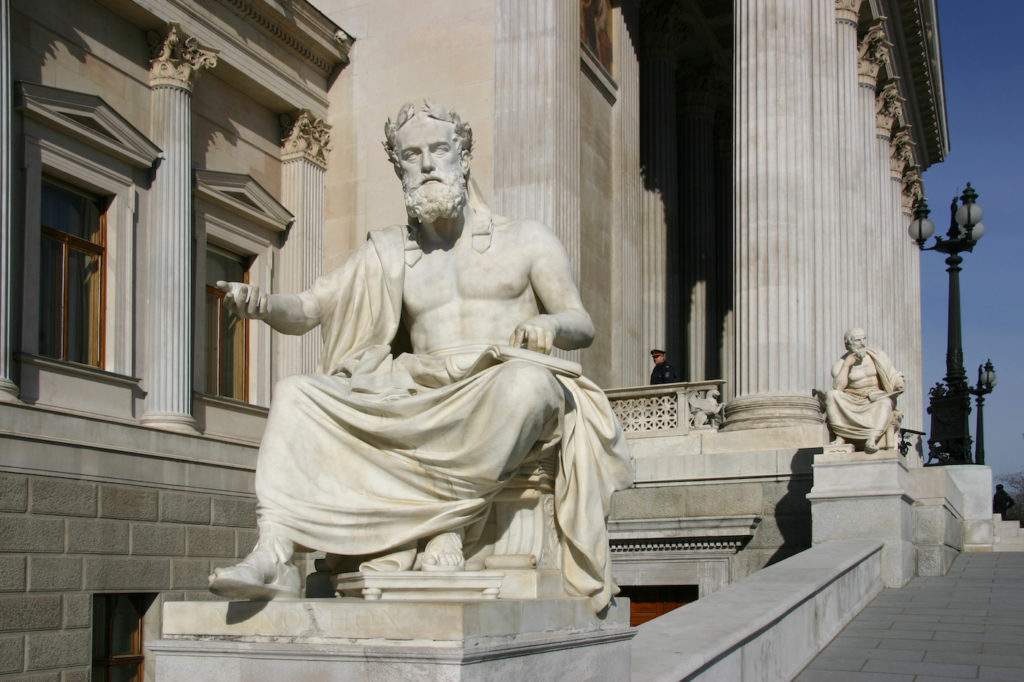When I was a graduate student, I took several courses with a leading New Left historian of the American revolutionary and founding periods. His “Readings in” seminars on these periods were models of historiography; we seemed to read everything that had been published in the last century, and weighed the merits of competing approaches to the subject. And his year-long research seminar was a full immersion in the practice of doing original work on the era. I’ll always be grateful for his tutelage.
But my late professor’s own research by that time, and for the remainder of his career, was fully dedicated to a “history from below” that sought to tell the stories of “ordinary” men and women of the revolutionary period: a shoemaker here, a private soldier in the Continental Army there. While a good case can be made for the intrinsic value of these accounts in filling out our historical understanding, it must also be admitted that the readership for works of this kind is narrow indeed—almost wholly confined to the authors’ fellow specialists in the academy.
Meanwhile, the market for biographies of the famous seems inexhaustible. Every year brings more books about Lincoln, Churchill, Washington; about famous actors, singers, artists, writers; about saints, sinners, prophets, villains. Why is there such an appetite for lives of the famous and the infamous?
It may be that there is some truth to the claim of Thomas Carlyle, who opened his 1840 lectures On Heroes, Hero-Worship, and the Heroic in History by asserting that “Universal History, the history of what man has accomplished in this world, is at bottom the History of the Great Men who have worked here. They were the leaders of men, these great ones; the modellers, patterns, and in a wide sense creators, of whatsoever the general mass of men contrived to do or to attain.” It’s not the whole truth, of course: the many unknown persons in “the general mass” are themselves indispensable to the movement of history. But what Carlyle says is not untrue. Without such men as Adams, Jefferson, and Washington, there would have been no American Revolution—certainly no successful one—for the shoemakers and private soldiers to play their parts in.
Start your day with Public Discourse
Sign up and get our daily essays sent straight to your inbox.And so we read biographies, believing with Carlyle that their subjects are “profitable company,” that we are “gaining something by” knowing about them. And so we are, from the best biographies, which cannot avoid being didactic in some way.
Without such men as Adams, Jefferson, and Washington, there would have been no American Revolution—certainly no successful one—for the shoemakers and private soldiers to play their parts in.
Certainly this was true by design in the case of James Boswell’s Life of Samuel Johnson, often considered to be the model of all modern biographical writing for its intimacy with its subject and its encyclopedic treatment of his life. Boswell, of course, fairly worshiped Johnson, and in his opening paragraph said, self-effacingly, that his hero was the one “who excelled all mankind in writing the lives of others.” Boswell may well have thought so, but in this respect he exceeded his master, for we continue to read Boswell’s Johnson, yet who today reads Johnson’s Lives of the Most Eminent English Poets? Still, Johnson is Boswell’s superior, inasmuch as we remain fascinated with the former thanks to the latter.
How old is the biographical genre? In a recent edition of selections from John Aubrey’s Lives of Eminent Men, a seventeenth-century work sometimes given the title Brief Lives because its entries can be as short as a single paragraph, the author of a foreword says that Aubrey “knew he was inventing the modern genre of biography.” Did he really? The claim leans heavily on the adjective “modern,” since lives of great men had been the subjects of books all the way back to antiquity. Yet for all of Aubrey’s interest in minutiae and seemingly trivial details, he has nothing on Boswell, whose Johnson runs 1,200 pages; the longest of Aubrey’s biographical sketches, that of Thomas Hobbes, is only twenty pages.
In this respect Aubrey resembles Plutarch, whose Lives of the Noble Grecians and Romans are generally a few dozen pages each. But where Aubrey is interested (and here is his “modernity”) in the personal, the odd, the out-of-the-way anecdote that presents each of his subjects as an earthy human being, Plutarch is interested in the virtues and vices of his generals, statesmen, and rulers with a view to their effect on political life. Many but not all his pairs of Greeks and Romans are directly compared to one another, and sometimes neither man comes off entirely well. When Plutarch considers Alcibiades and Coriolanus, both of whom “displayed on numerous occasions the daring and courage of the soldier, and the skill and foresight of the general,” the author ultimately pronounces that the Roman’s “love of distinction,” his “pride and insolence,” were “the faulty parts of his character, which in all other respects was a noble one”—yet those faults were his undoing. As for the Greek, Plutarch says Alcibiades was “the most entirely careless of human beings” when measured by the standards of “temperance, continence, and probity.”
Perhaps the very first biographer—one who, like Boswell, knew one of his subjects, and, like Plutarch, could study the historical evidence of another—was Xenophon, who is not as widely read today as he deserves. Xenophon’s Memorabilia is a remembrance of his friend and mentor Socrates, whose reputation he seeks to rescue from the unjust charges that led to his trial and execution at the hands of the Athenians. Readers familiar with the presentation of Socrates in Plato’s dialogues can profit from the complementary—and in some respects contrasting—account given by Xenophon, who blends personal observations of Socrates’ conduct (often saying he “witnessed” this or that action, just as though he were testifying in his friend’s defense) with brief dialogues whose provenance may be first- or secondhand. For Xenophon, “there was nothing more beneficial than being a companion of Socrates and spending time with him anywhere at all and in any matter whatsoever.”
A quite different work is The Education of Cyrus, a life of the great founder of the Persian empire who died a century before Xenophon’s birth. Cyrus’s greatness is undeniable, and his achievements owe something to his considerable virtues as a ruler and strategist. How much reliable knowledge Xenophon could have had of Cyrus’s every deed—let alone of his actual words, often “reported” in the Education—is a matter of considerable doubt. This subtle work should be considered, not a conventional biography, but a philosophical treatment of empire-building and the art of rule that uses the life of Cyrus to advance a thesis about political life. Given the ultimate fragility of the empire he built, Cyrus may stand as a great leader of men and agent of change who falls short of being the highest exemplar of statesmanship.
Boswell rules as the model for many modern biographers, who write about men and women they deeply admire, whether past or contemporary. And like Boswell, they have a tendency to tell you more than you really want to know.
In the examples above we seem to have some of the main themes and forms of biography. In Boswell, we have the admiring scribe at his subject’s side, omitting nothing but eliciting our admiration. In Aubrey we have the quick pencil sketch of human beings, making great men ordinary and ordinary men interesting. In Plutarch we have biography as public-spirited character analysis, with negative judgments pronounced as freely as positive ones. In Xenophon’s account of Socrates, we have a panegyric to the life of the mind, and in his account of Cyrus a philosophical treatment of the ambition to rule.
Boswell rules as the model for many modern biographers, who undertake to write about men and women they deeply admire, whether past or contemporary. And like Boswell, they have a tendency to tell you more than you really want to know, producing tedious doorstops or even multi-volume lives. It’s refreshing, by contrast, to read the works of authors like Richard Brookhiser and Paul Johnson, who aspire to an Aubreyan or Plutarchian brevity, with something of Aubrey’s emphasis on common humanity and Plutarch’s focus on character in public figures.
Animosity can be as powerful a motive as admiration in a biographer, of course, and the result is a kind of anti-Boswellian enterprise. I recently finished reading A. N. Wilson’s Darwin: Victorian Mythmaker, a relentlessly critical yet not wholly unsympathetic life of the evolutionary biologist. Wilson has mastered the details of his subject’s life as well as any admirer could, but he has also kept his distance from Darwin, and considers some of the most searching modern criticisms of his theoretical shortcomings. And lately I’ve begun to read Freud: The Making of an Illusion, by Frederick Crews, which bids fair to be an even more determined siege on the citadel of his subject (and at 750 pages, a longer one) than Wilson’s on Darwin.
Why should one want to read hundreds of pages debunking the case for someone’s greatness? Why, for heaven’s sake, should one want to write such a debunking? The explanation can be given in the reverse of Carlyle’s terms. Some of the “Great Men” who have most profoundly shaped the course of history are villains, not heroes—think of Hitler and Stalin, each the subject of many books. And sometimes figures taken for heroes have undeserved reputations for greatness, and the ledger of history must at least be rebalanced (think of Allen Guelzo’s Robert E. Lee: A Life), or an intellectual legacy entirely exploded—as with Wilson’s Darwin or Crews’s Freud.
We mere mortals may have more in common with my late professor’s unknown shoemakers and privates. But to understand our history, it is more often necessary to look up to the heights occupied by the most visible human beings—those whose thoughts, words, and actions have had the most far-reaching effects. Hence it is that the beating heart of history is often found in biography.














